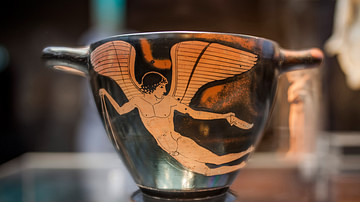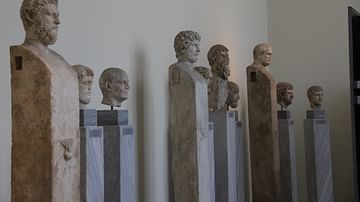Search
Did you mean: Melqart?
Search Results

Definition
Byzantium
The ancient city of Byzantium was founded by Greek colonists from Megara around 657 BCE. According to the historian Tacitus, it was built on the European side of the Strait of Bosporus on the order of the “god of Delphi” who said to build...

Definition
Eros
Eros was the Greek god of love, or more precisely, passionate and physical desire. Without warning Eros selects his targets and forcefully strikes at their hearts, bringing confusion and irrepressible feelings. In the words of Hesiod, he...

Definition
Hippolyta
Hippolyta, or Hippolyte, was a queen of the Amazons in Greek mythology. A daughter of Ares, the Greek god of war, and Otrera, queen of the Amazons, she is a significant figure in the legends of Hercules and Theseus. In the present day, she...

Definition
Selinus
Selinus (or Selinous, modern: Selinunte), located on the south-west coast of Sicily, was founded in the mid-7th century BCE by Greek colonists from Megara Hyblaea on the eastern side of the island. Selinus was the most western Greek colony...

Lesson Pack
Economy & Trade in Ancient Greece
We have prepared five lesson plans including classroom activities, assignments, homework, and keys as well as: Multiple choice quiz questions in an excel format Glossary of keywords and concepts in an excel format Open questions adaptable...

Article
The Life of Hercules in Myth & Legend
Hercules is the Roman name for the Greek hero Herakles, the most popular figure from ancient Greek mythology. Hercules was the son of Zeus, king of the gods, and the mortal woman Alcmene. Zeus, who was always chasing one woman or another...

Article
The Desecration of the Statues of Hermes, 415 BCE
On 7 June 415 BCE, various statues of the god Hermes were desecrated in Athens. The Peloponnesian War (431-404 BCE) had been raging for decades as one of the biggest civil wars in Ancient Greece, and the Athenians prepared for the expedition...

Article
The Life of Diogenes of Sinope in Diogenes Laertius
Diogenes of Sinope (c. 404-323 BCE) was a Greek Cynic philosopher best known for holding a lantern to the faces of the citizens of Athens claiming he was searching for an honest man. He was most likely a student of the philosopher Antisthenes...

Article
The Delian League, Part 6: The Decelean War and the Fall of Athens (413/2-404/3 BCE)
This text is part of an article series on the Delian League. The sixth and last phase of the Delian League begins with the Decelean War, also referred to as the Ionian War, and ends with the surrender of Athens (413/2 – 404/3 BCE). The final...

Article
Sicilian Temples (Greek Metrology)
Characteristics of Sicilian Archaic Temples The large dimensions of the components, the presence of a propteron, an adyton, and other specific elements of the plan and elevation speak for an originally very autonomous development of Sicilian...